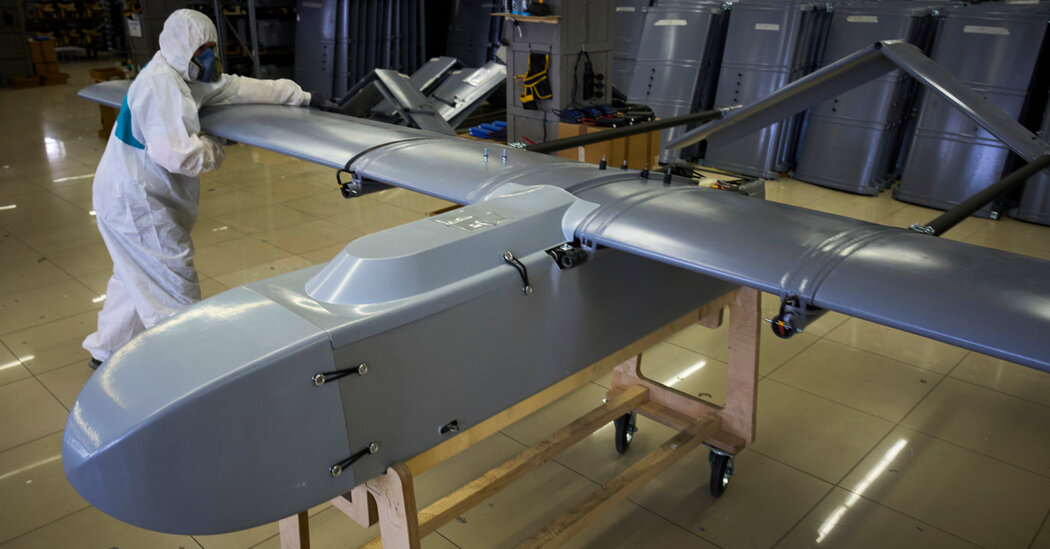If Silicon Valley start-ups began in garages, the origin story of Ukraine’s defense start-ups lies in basements. There, many workshops cobbled together drones from off-the-shelf parts, going underground to avoid Russian missiles.
These once small-scale, volunteer-run outfits are now transforming into defense corporations, in a process encouraged by the government of President Volodymyr Zelensky to scale up innovations. Among the companies, one stands out to both its supporters and its critics for the speed and scale of its rise: an emerging drone-manufacturing giant called Fire Point.
At the start of the full-scale war in February 2022, the business that became Fire Point was a casting agency for film and television productions, according to Ukrainian government registration documents. Its legally listed owner, Yehor Skalyha, is the chief executive of another company, At Point, that scouts film locations. Fire Point’s chief technology officer, Iryna Terekh, previously ran a company that made concrete outdoor furniture.
Now, the company is one of the largest contractors for the Ukrainian military, with $1 billion in contracts this year, according to its executives. At about 30 secret locations in Ukraine, Fire Point churns out long-range exploding drones using cheap materials like Styrofoam, plywood, plastic and a type of carbon fiber intended for racing bicycles.
Those drones are being used in a major campaign against Russian oil refineries that is intended to inflict economic damage on Russia and give Ukraine leverage in peace talks. The company says it is also ramping up production of a larger, longer-range weapon, called the Flamingo, that officials hope will bolster Ukraine’s ability to strike deep inside Russia.
But as Fire Point has raced ahead of a crowded field to become a national aerospace champion, the company has been dogged by accusations that it used connections to win contracts, and its executives have acknowledged being questioned in an anticorruption investigation.
Much of Ukraine’s military spending is cloaked in wartime secrecy, with billions of dollars channeled to domestic arms makers as Kyiv moves away from relying on donations from international allies. In a country with a long history of corruption in defense procurement, analysts and activists have raised concerns about how the Ukrainian government is awarding military contracts and where the profits are going.
Fire Point emerged from the same Ukrainian film and television industry where Mr. Zelensky, a former comedian, worked before his election as president in 2019. The film scouting company led by Fire Point’s owner was credited with location work for a 2016 romantic comedy starring Mr. Zelensky, “Eight Best Dates.” It has also worked on dozens of other productions unrelated to the president’s former film career.
A newspaper, The Kyiv Independent, reported in August that Ukraine’s National Anticorruption Agency was examining ties between Fire Point and a businessman, Timur Mindich, who is a half owner of a television studio started by Mr. Zelensky.
The newspaper said the agency was investigating whether Mr. Mindich was receiving Fire Point profits as an unnamed owner. Fire Point said that Mr. Mindich had asked to buy stock in the company, but that the owners had declined to sell.
Fire Point executives said that they were cooperating with the anticorruption inquiry and that it was focused not on their company, but on government officials. A spokesman for the anticorruption agency declined to comment.
The company has also been accused of receiving favorable treatment despite problems with the quality of its drones that critics say have made them less successful than other Ukrainian options in penetrating Russian air defenses.
The Public Anticorruption Council, an independent group watching over defense procurement, has called for a parliamentary inquiry into accusations of quality and pricing problems.
Fire Point says that its initial quality problems have been ironed out and that its main drone, the FP-1, is now reliably blowing up Russian refining equipment, starting fires and causing mayhem, as it was designed to do. That claim could not be independently verified.
Even as questions have been raised about Ukraine’s military contracting, drone manufacturers like Fire Point have been embraced as national heroes. The country’s quick adaptation of drones with commercially available components has evened the odds against Russia’s far larger army and swayed military analysts’ views of the future of war.
As Ukraine’s once patriotically driven drone shops rapidly commercialize, they are catching the attention of potential investors and Western joint venture partners. Norway and Ukraine this month announced a 20 million euro (around $23 million) fund for angel investments in Norwegian and Ukrainian drone start-ups.
“Nobody in the world has so much experience in unmanned missions,” Oleksandr Kamyshin, an adviser to Mr. Zelensky on strategic industries, said of Ukraine’s drone war. He added that Ukraine’s emerging industry should form joint ventures with Western defense contractors. “These drones are something you need in Europe and the United States,” he said.
Ukraine’s Ministry of Strategic Industries reports that 425 arms manufacturing companies opened in the country from 2022 to 2024. A separate estimate by Brave 1, a branch of the Ministry of Digital Transformation encouraging military innovation, said that more than 2,000 companies in Ukraine were now designing or making weapons.
Just in the sector of long-range strike drones — the type that Fire Point makes — Ukraine has more than 20 competing companies, said Ihor Fedirko, the director of the Council of Defense Industries, a trade group.
Fire Point’s FP-1 drone resembles a miniature airplane. It blasts off with a rocket-assisted start and is powered by a two-stroke engine like those on chain saws. It flies about 1,000 miles and carries a 260-pound warhead. Though made from inexpensive materials, the drone is capable of hitting much of western Russia.
Ukraine’s approach to long-range drones was first pioneered by Russia using low-cost Iranian-designed models. The tactic, and the business associated with it, is about volume. Most of the drones are intercepted, which means they must remain cheap. But some get through, and unlike an airplane, an exploding drone has to work only once.
Fire Point says that its drones now conduct 60 percent of Ukraine’s attacks inside Russia. The Ukrainian military’s drone strikes have put Russia, a country that has prided itself on its air defenses going back to the Cold War, under daily bombardment.
The company’s contracts this year make up about 10 percent of Ukraine’s defense procurement spending. The government taps opened even though Fire Point avoided a legally mandated price negotiation during contracting, according to a government audit.
Procurement officers had estimated, based on costs for parts and labor, that Fire Point’s FP-1 drone could be produced more cheaply than its offering price in December 2024 of about $58,000 per unit.
That assessment should have triggered a negotiation by Ukraine’s Defense Procurement Agency but did not, auditors found. Without that negotiation, contracts were awarded for about $16.7 million more than the lower-cost option for producing the drones, auditors said.
In interviews, company executives said that the price of their drones was already rock-bottom for a weapon duplicating abilities of cruise missiles that cost more than $1 million each.
Maj. Yurii Kasyanov, a former drone unit commander, said in an interview that Fire Point had won contracts despite design flaws, while a model he designed, called the Spear, was ignored.
His drone was passed over, he said, despite his having demonstrated the model’s jamming-proof guidance system by exploding two drones in 2023 yards away from the flag flying over the Kremlin in Moscow.
Major Kasyanov said that he had testified as a witness in the anticorruption investigation related to Fire Point, and that afterward, the military had disbanded his drone unit.
In response to the quality questions, Ms. Terekh, 33, Fire Point’s chief technology officer, said that manufacturing drones should be seen as a new industry that breaks quality standards in aircraft manufacturing for the sake of economy.
In addition to the FP-1 drone, Fire Point says it is increasing output of the Flamingo, a larger, heavier craft with a jet engine, a range of about 1,800 miles and a one-ton warhead. David H. Petraeus, a former Army general and C.I.A. director, has called the Flamingo a potential “game changer” in the war.
The Flamingo’s effectiveness has yet to be tested at scale. Also something of a mystery is its name.
Ms. Terekh said engineers had painted one prototype pink, leading to the name. The bright color was intended to aid a search for debris after a test firing, and the company was out of red paint, she said.
Another account holds that the pink coloring was an error and that engineers had joked: “What is the worst that can happen if a woman is in charge of a defense company? The weapons will be pink.”
Oleksandr Chubko and Nataliia Novosolova contributed reporting.
Andrew E. Kramer is the Kyiv bureau chief for The Times, who has been covering the war in Ukraine since 2014.
The post 3 Years Ago It Was a Casting Agency. Now It Has $1 Billion in Drone Contracts. appeared first on New York Times.




